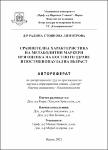I hereby declare that I will use the electronic library contents in compliance with COPYRIGHT AND RELATED RIGHTS ACT, Article 24, paragraph 1, item 9, only for scientific, cultural and educational purposes, without commercial gain, without commercial interest and non-profit.No Yes

Comparative Characteristics of Metabolic Markers in The Assessment of Bone Health in Postmenopausal Age // Сравнителна характеристика на метаболитни маркери при оценка на костното здраве в постменопаузална възраст

Date
2022Author
Димитрова, Радина
Dimitrova, Radina
Radina.Dimitrova@mu-varna.bg
Metadata
Show full item recordAbstract
Метаболитният синдром и остеопорозата са два социално-значими здравни проблема, чието разпространение в световен мащаб непрекъснато нараства. За потенциалните връзките между тях отдавна се говори, но резултатите в литературата от клиничните проучвания остават противоречиви.
Оценените в дисертационния труд взаимовръзки на някои кардио-метаболитни и инфламаторни маркери с костния интегритет в постменопаузална възраст разкриват определени зависимости, които могат да бъдат от полза за по-комплексна превенция, профилактика и лечение на остеопорозата. Проведените комплексни анализи предполагат, че сумарната връзка на метаболитния синдром с костното здраве все пак зависи от броя, комбинацията, степента на изява на компонентите на синдрома, както и от съпътстващите го антропометрични и метаболитни промени. От друга се поставя акцент върху необходимостта от своевременното идентифициране и коригиране на негативно свързаните с костния интегритет параметри чрез подходящ хигиенно-диетичен режим и добавяне на медикаменти, които освен кардио-метаболитни ползи притежават и предполагаеми плеотропни скелетни ефекти. Metabolic syndrome and osteoporosis are two socially important health problems. Their worldwide distribution is constantly growing. The potential association between metabolic syndrome and osteoporosis has long been discussed, but the results of the clinical trials remain controversial.
This thesis analyzes the relationships of some cardiometabolic and inflammatory markers with bone integrity in postmenopausal age. The obtained results reveal specific correlations that may be useful for more complex prevention, prophylaxis and treatment of osteoporosis. Furthermore, the conducted analyses suggest that the complex association of the metabolic syndrome with bone health depends on the number, combination, degree of manifestation of each component of the syndrome, and the accompanying anthropometric and metabolic changes. On the other hand, emphasis is placed on the need for timely identification and correction of parameters that are negatively related to bone integrity through an appropriate lifestyle change and initiation of appropriate drugs that have presumed pleiotropic skeletal effects in addition to cardiometabolic benefits.
